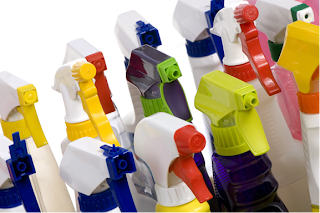Household Spray Cleaners Pose Greatest Danger to Toddlers
Good news is that accidental poisonings have dropped by almost half since 1990, U.S. report shows
By Madonna Behen, HealthDay Reporter

MONDAY, Aug. 2 (HealthDay News) -- The number of injuries to young children caused by exposure to household cleaning products have decreased almost by half since 1990, but roughly 12,000 children under the age of 6 are still being treated in U.S. emergency rooms every year for these types of accidental poisonings, a new study finds.
Bleach was the cleaning product most commonly associated with injury (37.1 percent), and the most common type of storage container involved was a spray bottle (40.1 percent). In fact, although rates of injuries from bottles with caps and other types of containers decreased during the study period, spray bottle injury rates remained constant, the researchers reported.
"So many household products are sold in spray bottles these days, because for cleaning purposes they're really easy to use," said study author Lara B. McKenzie, a principal investigator at Nationwide Children's Hospital's Center for Injury Research and Policy. "But spray bottles don't generally come with child-resistant closures, so it's really easy for a child to just squeeze the trigger."
McKenzie added that young kids are often attracted to a cleaning product's pretty label and colorful liquid, and may mistake it for juice or vitamin water. "If you look at a lot of household cleaners in bottles these days, it's actually pretty easy to mistake them for sports drinks if you can't read the labels," added McKenzie, who is also assistant professor of pediatrics at Ohio State University. Similarly, to a young child, an abrasive cleanser may look like a container of Parmesan cheese.
Researchers at Nationwide Children's Hospital examined national data on roughly 267,000 children aged 5 and under who were treated in emergency rooms after injuries with household cleaning products between 1990 and 2006. During this time period, 72 percent of the injuries occurred in children between the ages of 1 and 3 years.
The findings were published online Aug. 2 and will appear in the September print issue of Pediatrics.
To prevent accidental injuries from household products, the American Academy of Pediatrics recommends storing poisonous substances in locked cabinets and out of sight and reach of children, buying products with child-resistant packaging, keeping products in their original containers, and properly disposing of leftover or unused products. "This study just confirms how often these accidents still happen, how disruptive they can be to health, and how expensive they are to treat," said Dr. Robert Geller, medical director of the Georgia Poison Control Center in Atlanta. "If you consider that the average emergency room visit costs at least $1,000, you're looking at almost $12 million a year in health-care costs," he explained. "Often a young child gets exposed to these kinds of products when someone is cleaning, and leaves a bottle open on the counter because they're in the middle of using it," said Geller, who is also a professor of pediatrics at Emory University School of Medicine. "So a good reminder is to always close the product completely after using it, even if you plan to open it again in a few minutes."
That scenario is almost exactly what happened to 1-year-old Keegan Ensign, who was treated at Nationwide's emergency department earlier this year. "It was one of the first nice days in May, and we were all outside playing on the driveway," said Keegan's mother, Tamara Ensign, 29, a mother of three in Lewis Center, Ohio. "I had a bottle of dish soap out because the kids wanted to play car wash, and I set it down on the pavement and turned my back for just a second. When I turned back around, Keegan was holding the bottle and wailing." Although Keegan's mother didn't think he had swallowed very much of the soap, she called poison control because he was coughing and wheezing a lot. Concerned that he might have aspirated some of the cleaner into his lungs, the poison control official advised Ensign to take Keegan to the hospital. Thankfully, doctors there determined that the toddler's lungs were clear and his oxygen levels were fine, and he completely recovered, but Ensign said the incident was a harsh wake-up call. "Inside the house, I've always been good about keeping everything in a locked cabinet, but because we were outside in a different setting, it didn't cross my mind until it was too late." McKenzie says if you don't want to keep spray bottles locked up, you should at least turn the nozzle to the closed position, which makes it a lot harder for a curious toddler to grab it and squeeze.
Parents who suspect their child has come in contact with a poison should immediately contact the Poison Center at 1-800-222-1222, which will direct callers to their local Poison Center. If a child is unconscious, not breathing, or having seizures, they should call 9-1-1.
More information
For more on household product safety, go to the U.S. National Library of Medicine.
SOURCES: Lara B. McKenzie, Ph.D., principal investigator, Center for Injury Research and Policy, Nationwide Children's Hospital, and assistant professor, department of pediatrics, Ohio State University College of Medicine, Columbus; Robert Geller, M.D., medical director, Georgia Poison Control Center, and professor, pediatrics, Emory University School of Medicine, Atlanta; September 2010, Pediatrics
Last Updated: Aug. 02, 2010
Copyright © 2010 HealthDay. All rights reserved.






